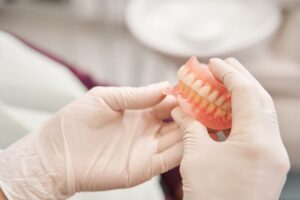Do Dentures Affect Nutrition?
July 2, 2025

When people think of dentures, they usually picture a restored smile and improved confidence. But dentures aren’t just about appearance — they can also play a big role in your nutrition. Since your teeth are essential for chewing and breaking down food, any changes to how your mouth functions can impact the way you eat. So, do dentures affect nutrition? The short answer: they can, but with the right fit and habits, you can still enjoy a balanced, healthy diet.
How Dentures Can Change the Way You Eat
Natural teeth and their roots are firmly anchored into the jawbone, which gives you strong biting and chewing power. Dentures, while designed to mimic teeth, rest on the gums (or attach to implants) and don’t always provide the same stability. This can make it harder to chew certain foods, especially tough meats, crunchy vegetables, or sticky snacks.
If dentures don’t fit well, they may shift or cause sore spots when eating. This can lead some people to avoid nutrient-rich foods that are more difficult to chew, potentially resulting in a less varied diet.
Possible Nutritional Concerns
When dentures limit what you can comfortably eat, you might:
- Miss out on fiber if you avoid raw fruits, vegetables, and whole grains.
- Reduce protein intake if chewing meat or nuts becomes difficult.
- Lower vitamin and mineral consumption if you skip certain food groups.
- Rely on softer, processed foods that are higher in sugar and lower in nutrients.
Over time, these changes can impact your overall health, energy levels, and even your immune system.
Tips for Eating Well With Dentures
The good news is that most nutritional challenges with dentures can be overcome with adjustments to your eating habits, food choices, and denture fit.
Start with Soft Foods
When you first get dentures, begin with foods that are gentle on your gums, such as mashed potatoes, yogurt, oatmeal, scrambled eggs, and soups.
Cut Food into Smaller Pieces
This makes chewing easier and reduces strain on your dentures.
Cook Foods Until Tender
Steaming or roasting vegetables can make them softer without losing too many nutrients.
Experiment With Protein Sources
If chewing meat is difficult, try alternatives like eggs, fish, tofu, beans, or lentils.
Practice Chewing Evenly
Chewing on both sides of your mouth helps keep dentures stable and prevents uneven wear.
Visit Your Dentist Regularly
A well-fitting denture is key for comfortable eating. Your dentist can adjust or reline your dentures if they feel loose or cause discomfort.
Dentures can affect nutrition if they make eating certain foods more challenging, but they don’t have to lead to poor dietary habits. With the right fit, mindful food preparation, and a willingness to adapt your meals, you can still enjoy a nutrient-rich diet. The key is to work closely with your dentist, listen to your body, and make small, sustainable adjustments to keep both your smile and your overall health in great shape.
About the Author
Dr. Philip A. Lisk has been practicing dentistry in the North Raleigh area for more than 20 years! He is a 1997 graduate of the University of North Carolina School of Dentistry. He has spent time continuing his education at renowned institutions including the Dawson Academy and also stays current through memberships in the American Dental Association and the North Carolina Dental Society. If you’re in the market for dentures to replace your teeth, schedule an appointment with Dr. Lisk and our team through our website or call (919) 870-6892.
No Comments
No comments yet.
RSS feed for comments on this post.
Sorry, the comment form is closed at this time.

